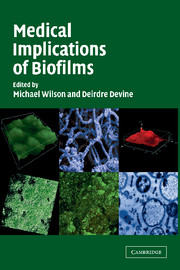Book contents
- Frontmatter
- Contents
- Preface
- List of Contributors
- PART ONE INTRODUCTORY CHAPTERS
- PART TWO BIOFILMS ON PROSTHETIC DEVICES
- PART THREE ORAL BIOFILMS
- PART FOUR BIOFILMS ON SHEDDING SURFACES
- 11 Dissection of the Genetic Pathway Leading to Multicellular Behaviour in Salmonella enterica Serotype Typhimurium and Other Enterobacteriaceae
- 12 Bacterial Growth on Mucosal Surfaces and Biofilms in the Large Bowel
- 13 Pseudomonas aeruginosa Biofilms in Lung Infections
- Index
- References
12 - Bacterial Growth on Mucosal Surfaces and Biofilms in the Large Bowel
Published online by Cambridge University Press: 23 November 2009
- Frontmatter
- Contents
- Preface
- List of Contributors
- PART ONE INTRODUCTORY CHAPTERS
- PART TWO BIOFILMS ON PROSTHETIC DEVICES
- PART THREE ORAL BIOFILMS
- PART FOUR BIOFILMS ON SHEDDING SURFACES
- 11 Dissection of the Genetic Pathway Leading to Multicellular Behaviour in Salmonella enterica Serotype Typhimurium and Other Enterobacteriaceae
- 12 Bacterial Growth on Mucosal Surfaces and Biofilms in the Large Bowel
- 13 Pseudomonas aeruginosa Biofilms in Lung Infections
- Index
- References
Summary
THE LARGE INTESTINAL MICROBIOTA
It has been estimated that of the 1014 cells associated with the human body, approximately 90 per cent are microorganisms, and the vast majority of these organisms are bacteria growing in the large intestine (Savage, 1977). The large bowel is the main area of permanent microbial colonisation of the human gastrointestinal tract; gastric acid kills most oral and environmental microorganisms in the stomach, whereas the rapid passage of digestive materials through the upper gut does not allow time for significant bacterial growth to occur (Macfarlane and Cummings, 1991). However, the rate of movement of intestinal contents slows markedly in the large gut, which facilitates development of rich and diverse bacterial communities (Cummings, 1978; Cummings et al., 1993). The growth and metabolic activities of these microbial populations are influenced to a considerable degree by diet, as well as by the structure and physiology of the colon (Macfarlane et al., 1995).
The large intestine is an open system in the sense that food residues from the small intestine enter at one end and, together with bacterial cell mass, are excreted at the other end. Because of this, the colon is often viewed as being a continuous culture system, although only the caecum and ascending colon really exhibit characteristics of a continuous culture (Cummings et al., 1987; Macfarlane, Macfarlane, and Gibson, 1998).
- Type
- Chapter
- Information
- Medical Implications of Biofilms , pp. 262 - 286Publisher: Cambridge University PressPrint publication year: 2003
References
- 2
- Cited by

